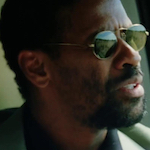 In the early ‘80s, the English ad director Tony Scott, fresh off of his movie debut THE HUNGER, wanted to adapt the A.J. Quinnell book Man on Fire. According to some of the vague reports I found, producer Arnon Milchan got some other guy for the MAN ON FIRE ultimately released in 1987 because he didn’t have faith in a director who was only on his second movie. 17 years later, when Milchan decided to try again, he was like “okay, yeah, I guess you can make it as your 12th movie.”
In the early ‘80s, the English ad director Tony Scott, fresh off of his movie debut THE HUNGER, wanted to adapt the A.J. Quinnell book Man on Fire. According to some of the vague reports I found, producer Arnon Milchan got some other guy for the MAN ON FIRE ultimately released in 1987 because he didn’t have faith in a director who was only on his second movie. 17 years later, when Milchan decided to try again, he was like “okay, yeah, I guess you can make it as your 12th movie.”
Times were different, so Scott had screenwriter Brian Helgeland (A NIGHTMARE ON ELM STREET 4, HIGHWAY TO HELL, THE POSTMAN, PAYBACK, BLOOD WORK, MYSTIC RIVER, LEGEND) change the setting from Italy to Mexico, where the sorts of kidnappings in the story had become more common. Nevertheless, Quinnell found it a much better and more faithful adaptation of his book. I haven’t read it, but as a movie Scott’s version obliterates the other one in every category I can think of.
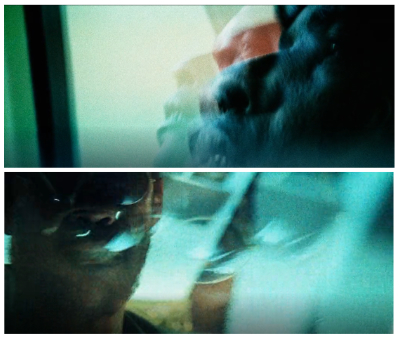 Back in 2004, as you can see in my original review, I didn’t like it so much. I was especially bothered by some of the stylistic choices – the parts where Scott flashes and speeds up and quick cuts through shaky closeups and double exposures and stuff. He loves doing this thing where the image jumps around like the film got loose from the gate. Watching it again I was surprised that at first it seemed more extreme than I remembered. The credits ended but the jitters and avid farts continued, like DESPERADO got Brundleflyd with the credits of SE7EN. But then it calms down and I think Scott actually uses that sort of energy pretty strategically. It comes in during times of chaos and paranoia, as if the movie’s adrenaline starts pumping and its heart and breathing rates get out of control. Plus the grainy, saturated look he keeps messing around with looks really cool. I’m okay with it now. It works for me.
Back in 2004, as you can see in my original review, I didn’t like it so much. I was especially bothered by some of the stylistic choices – the parts where Scott flashes and speeds up and quick cuts through shaky closeups and double exposures and stuff. He loves doing this thing where the image jumps around like the film got loose from the gate. Watching it again I was surprised that at first it seemed more extreme than I remembered. The credits ended but the jitters and avid farts continued, like DESPERADO got Brundleflyd with the credits of SE7EN. But then it calms down and I think Scott actually uses that sort of energy pretty strategically. It comes in during times of chaos and paranoia, as if the movie’s adrenaline starts pumping and its heart and breathing rates get out of control. Plus the grainy, saturated look he keeps messing around with looks really cool. I’m okay with it now. It works for me.
(Cinematographer Paul Cameron had just done GONE IN 60 SECONDS, SWORDFISH, and COLLATERAL – just the right mix of Bruckheimer and class for this project. Editor Christian Wagner had been in Scott’s editing department since REVENGE, graduated to full editor for TRUE ROMANCE, and also did FACE/OFF, MISSION:IMPOSSIBLE 2 and DIE ANOTHER DAY.)
Denzel Washington (between OUT OF TIME and THE MANCHURIAN CANDIDATE) plays John Creasy, burnt out and explicitly alcoholic ex-CIA badass. He’s so haunted by guilt over the shit he used to do for a living that when he goes to visit his old agency buddy Paul Rayburn (Christopher Walken, KANGAROO JACK) he doesn’t quite make it through a full minute of small talk before bringing it up. He fronts like he just came by on a whim, just wanted a friendly visit, but he can’t pretend very well.
I think it’s the key to the whole movie, and Washington’s performance. He’s talking about his work, suddenly exhales, looks away, squints, smacks his lips. Thinking about it, looking pained. Then he swings his head back and just blurts it out.
“Do you think God will forgive us for what we’ve done?”
Rayburn just matter-of-factly says, “No.”
“You don’t. Me either.”
And then they change the subject.
I love this friendship. Rayburn is in a better place than Creasy because he fell in love, moved to Mexico, “lives like a king down here.” And meanwhile this is where Creasy is at, unable to think about anything else, coming to Rayburn for guidance, without saying as much.
Meanwhile, there’s this rich guy in Mexico City, Samuel Ramos (Marc Anthony, THE SUBSTITUTE), who inherited a now failing auto plant in Juarez. There have been some kidnappings for ransom lately, and his American wife Lisa (Radha Mitchell between VISITORS and FINDING NEVERLAND, occasionally trying for a Texas accent) wants him to hire a bodyguard to ferry their 9-year-old daughter Pita (Dakota Fanning in her eighth movie) to her private school. His lawyer Jordan Kalfus (Mickey Rourke between ONCE UPON A TIME IN MEXICO and SIN CITY) convinces him to hire a cheap one just long enough to keep their kidnap insurance policy, and Rayburn recommends Creasy for the job. Creasy doesn’t think he’s up to it, but Rayburn says “it’s all for show” and “it’s not exactly a scam, Crease. Even at half speed you’re pretty damn good.”
This is an aspect absent from the ’87 version that I really loved here: Creasy is in some ways unhireable and in others ridiculously overqualified. It makes sense. When Ramos meets him he says, “Your resume is quite extensive. 16 years military experience, extensive counterterrorism work. I’m surprised anybody could afford you. What’s the catch?”
“I drink.”
“How does that affect you?”
“Eh… Coordination, reaction time. If, uh, top professionals try to kidnap your daughter I’ll do the best I can, but the service’ll be on par with the pay.”
“What if amateurs try it?”
“I’d prob’ly kill ‘em.”
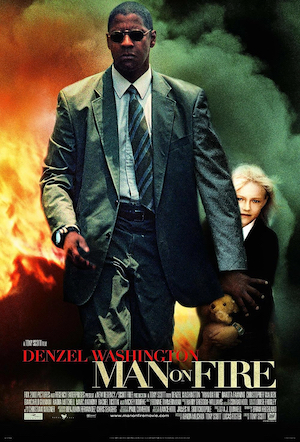 That wins over Ramos, and it won me over too. It’s the résumé exposition you normally get in a just-how-badass-is-he scene, plus the character drama of Creasy’s unflinching honesty and/or lack of desperation to get the job. And just this illustration of Ramos weighing Creasy’s pros and cons gives him more characterization than the father in the earlier version (even before plot twists force us to reconsider what’s going on in the scene).
That wins over Ramos, and it won me over too. It’s the résumé exposition you normally get in a just-how-badass-is-he scene, plus the character drama of Creasy’s unflinching honesty and/or lack of desperation to get the job. And just this illustration of Ramos weighing Creasy’s pros and cons gives him more characterization than the father in the earlier version (even before plot twists force us to reconsider what’s going on in the scene).
Ramos brings Creasy to meet his wife, saying not to mention the alcohol thing, then gives a funny look when she offers Creasy a drink and he accepts without hesitation. From the way he chugs his Jack and water and hands the glass right back to her I’m thinking maybe he doesn’t want this job.
Pita is clearly gifted. She plays piano, loves school, speaks very good Spanish and English, says “hola” to everyone on the house staff by first name, wants a dog, loves her teddy bear, names it after Creasy since he’s “a big, sad bear.”
“Is he sad?” her mom asks.
“I think. Or something.” Wise kid. Well put.
The last bodyguard Emilio “forgot to take” his parrot “Bird” when he left. Creasy soon shoos the poor guy out the window. Days later Pita sees Bird hanging around outside, asks how he got out. Once again, Creasy doesn’t hesitate to tell the truth, and Pita seems to respect it. “Better to be free, right?”
It’s crucial to the movie that they found Fanning, one of those rare child actors who just lights up the screen, somehow seems very natural saying all this dialogue, and projects preternatural intelligence, but not in a cloying way at all. Pita/Fanning and Creasy/Washington have great chemistry, her precociousness bouncing humorously off his gruff sarcasm until it makes a crack and burrows through and they start to bond. Creasy breaks her heart saying “I’m not bein paid to be your friend, I’m bein paid to protect ya, so no more questions, that’s it, period,” and then telling her not to cry. She keeps her composure but suddenly gets out of the car – he freaks out like she’s gonna run off, so maybe he’s seen the ’87 version – but she just moves to the back seat. Cold.
He keeps trying to talk his way out of the job, but it doesn’t work. So he stays up late drinking Jack Daniels (no water), having doubts, pacing around with his gun. Earlier he heard “Blue Bayou” playing at a little kiosk on the street and bought a The Very Best of Linda Ronstadt CD. It’s featured again here, but intercut with aggressive Nine Inch Nails snippets. I like the idea that he probly wouldn’t have gone looking for a Linda Ronstadt CD, but it was playing from this small selection when he walked by and it spoke to him so he bought it on a whim. “I feel so bad I got a worried mind / I’m so lonesome all the time.” But when he tries to shoot himself in the head the gun jams.
This is another key scene in the movie, and in the Creasy-Rayburn friendship. It’s the middle of the night but Creasy paces around in the rain and calls Rayburn, who has at least four cell phones laid out on his dresser. “Hey, listen,” Creasy says. “You— you ever have a— a 9mm round that didn’t go off?”
Rayburn suggests maybe it’s a bad primer, or the firing pin’s off. He asks “What were you shooting at?,” lies that he wasn’t asleep, he was up watching TV, and asks “Crease? You all right?” He doesn’t say “It sounds like you tried to kill yourself?” and Creasy doesn’t say “I’m trying to confirm that this is some sort of sign that I should stay alive,” but I think they both know.
And Creasy is reborn. Either that or he’s just a natural swim coach. After Pita’s practice she frets that she never wins. He tells her she’s the fastest swimmer, just slowest off the blocks, and becomes her tough love coach training her not to flinch at the sound of the firing pistol. Later she catches him smiling and they joke around about it. Oh shit, they’re friends now! He even takes her out to eat with Rayburn. She gives Creasy a medallion of St. Jude in a teddy bear shaped case, presents it like an adult would. He almost cries.
As you know, this is a movie about a kidnapping. The fun part is almost over. But one of the most beautiful scenes in the movie is right before it happens. Creasy drops Pita off at her piano lesson, so he has an hour to kill, during which he takes a moment to just enjoy the act of living. He sits down on a bench, he’s throwing a tennis ball to Pita’s dog Sam. He can hear her from an upstairs window, interrupting her song with burps, as he instructed her (to get out of taking piano lessons). But she starts to play, he looks down at the dandelion she put in his lapel, he smiles, there’s a nice breeze, birds are singing. Scott vividly captures that feeling of having nothing specific to do and it’s a nice day and you just take a breath and appreciate the world around you.
But then Sam barks at another dog, Creasy has to put him in the car, suddenly he’s on the job because he notices cop cars blocking off the road, recognizes a license plate, realizes what’s about to happen. You could interpret the enjoying-life scene as attempted misdirection, making everything seem happy and nice right before something horrible happens, but that’s really not its main purpose. Later Rayburn will say that Pita “gave him permission to live again,” and that’s what’s going on in this scene. Creasy had finally decided to stop punishing himself for the things he’s done and let himself be happy. So when the kidnappers snatch that away from him, that’s bad news for all involved. He’s gonna go back to doing those things he couldn’t forgive himself for.
I love the touch that he fires his gun in the air like a starter pistol as his signal for Pita to run. But they get her, and they shoot him. The Scott-o-vision works well here. Mostly closeups, the lack of geographic clarity making you nervous, the guns firing thunderously, casings clinking, the chaos building to a strobe only as Creasy loses consciousness.
Then the movie completely shifts gears. We meet crusading TV reporter Mariana Garcia Guerrero (Rachel Ticotin, TOTAL RECALL, ONE GOOD COP, F/X2, FALLING DOWN, TURBULENCE), director of the Agency for Federal Investigation and former director of Interpol Miguel Manzano (Giancarlo Giannini, MIMIC), and Federal Judicial Police lieutenant Victor Fuentes (Jesus Ochoa, GET THE GRINGO). The Ramos family sit around worrying, the lawyer acts conspicuous, a drop is made but goes wrong and the kidnapper’s nephew is killed.
Manzano knows the “anti-kidnapping” division are part of a corrupt police gang called La Hermandad who like to steal ransom money, other people have other schemes going, “The Voice” on the phone (Roberto Sosa, MISS BALA) tells Lisa “it’s too late,” and everybody assumes Pita is dead. I like when Lisa screams “FUCK OFF!” and starts slapping random task force cops until they leave her house.
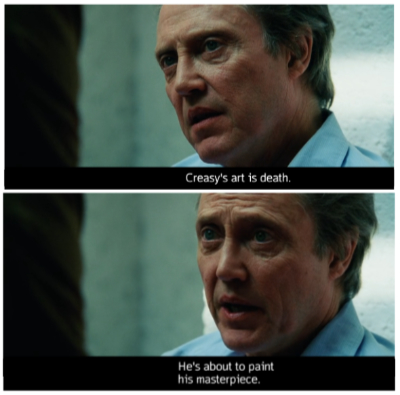 When Creasy gets out of the hospital the reporter approaches him, wants his help to bust La Hermandad, gives him information to track them down. (Also she shows him that they put a curse on him and he says, “Ha. They’re a little late.) We get some action/revenge movie favorites: He makes a cool speech about how he’s gonna kill ‘em all, there’s a weapons buying montage, slow motion strutting to groovin guitar, and (foreshadowing Denzel’s future as an EQUALIZER) there are some more-brutal-than-is-standard-for-the-genre torture scenes, like cutting off the fingers of a guy he duct-taped to a steering wheel. Best of all, the little scene where Rayburn gets to be his hype man, his Colonel Trautman, giving one of the all time great “just how badass is he?” lines, or more like a “just how savage is this motherfucker?”
When Creasy gets out of the hospital the reporter approaches him, wants his help to bust La Hermandad, gives him information to track them down. (Also she shows him that they put a curse on him and he says, “Ha. They’re a little late.) We get some action/revenge movie favorites: He makes a cool speech about how he’s gonna kill ‘em all, there’s a weapons buying montage, slow motion strutting to groovin guitar, and (foreshadowing Denzel’s future as an EQUALIZER) there are some more-brutal-than-is-standard-for-the-genre torture scenes, like cutting off the fingers of a guy he duct-taped to a steering wheel. Best of all, the little scene where Rayburn gets to be his hype man, his Colonel Trautman, giving one of the all time great “just how badass is he?” lines, or more like a “just how savage is this motherfucker?”
I still got a chuckle out of the part where he wears a black band t-shirt over white long sleeved t-shirt and a durag so he can go into a dance club. Denzel having to listen to music that could be in MORTAL KOMBAT is always funny. (See also: VIRTUOSITY.)
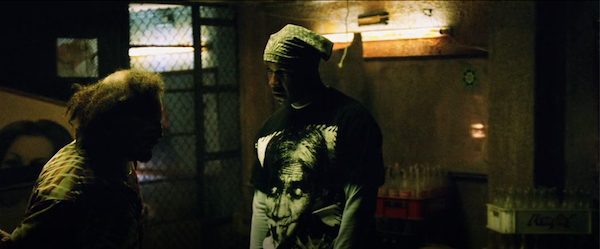
Another good laugh is when he sets a fire in the back of the club and doesn’t want everyone to burn to death, so he goes onto the dancefloor and fires a shotgun in the air, but everybody just cheers like when the sprinklers turn on at the blood rave in BLADE. (They haven’t had Pita’s swim training.) On the third shot they get the picture, go outside and cheer from across the street when the building explodes.
Creasy fake bonds with one of his victims about being from Jersey, he claims to be a low level employee and gives him useful information, but Creasy’s obviously just doing a good cop thing, so it’s very menacing. At least he accidentally saves a different kidnapped girl in the process. That’s admirable.
There’s a famous/infamous scene where he explains to a guy that there’s a bomb up his ass. He goes through the trouble of having a second capsule, detonator and C4 to show to the guy and explain that that’s what’s up his butt. Very professional. The sadism of this scene rubbed me the wrong way the first time, but now I don’t mind as much – maybe ‘cause I’ve seen how Denzel rolls in the EQUALIZER trilogy. It’s funny how completely he takes away this powerful man’s power, not with the butt thing but by not giving a shit at all when he tells him he’s the president of La Hermandad. Creasy says, “You’re the president? The president. Wow.” Then moves on.
A crazy thing I forgot is that he does it just above the freeway. People are driving by as this is going on. Somebody probly gets some splatter on their windshield and doesn’t know what it is.
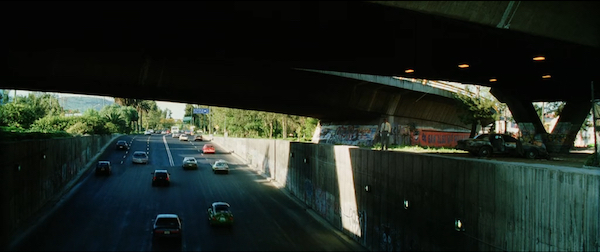
Reminds me of the ending of THE TEXAS CHAINSAW MASSACRE 2 as I originally knew it in its open frame VHS transfer. A truck drives by at the last second and you realize all this madness has been going on right under the noses of who-knows-how-many truckers and travelers.
Another thing about Denzel: not many Oscar winners (or even action stars) get to do a slow motion walk away from an ass-bomb explosion.
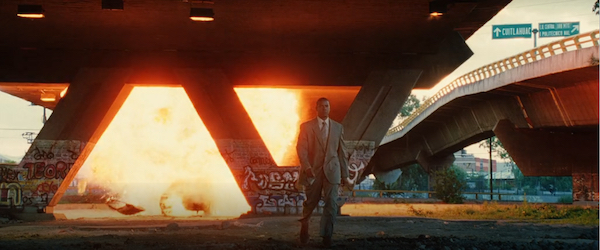
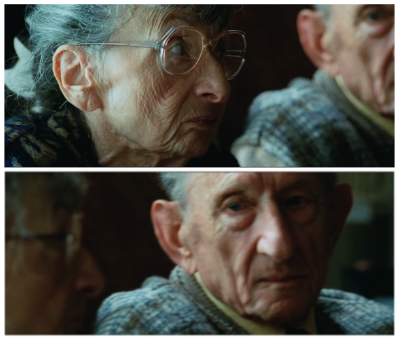 Another deranged and darkly funny scene is when he commandeers an elderly couple’s apartment because their window has a good shot at a particular intersection. The old man tries to appeal to his Christian sense of forgiveness but he keeps loading his bazooka and says, “Forgiveness is between them and God. It’s my job to arrange the meeting.” The look the couple exchange after hearing that crazy shit is priceless. Anyway, he goes on to arrange quite a few meetings.
Another deranged and darkly funny scene is when he commandeers an elderly couple’s apartment because their window has a good shot at a particular intersection. The old man tries to appeal to his Christian sense of forgiveness but he keeps loading his bazooka and says, “Forgiveness is between them and God. It’s my job to arrange the meeting.” The look the couple exchange after hearing that crazy shit is priceless. Anyway, he goes on to arrange quite a few meetings.
The one part I mentioned hating in my original review that I still hated is when Creasy says, “revenge is a meal best served cold.” Why have him say something so hackneyed? And how does it even apply to this situation? I don’t get it. But that’s the only part.
I’m not sure if it’s intentional, but I think it’s fitting, that the action/revenge stuff is so bitter-tasting that I’m more into the emotional parts. The scenes with Rayburn, the scene where Sister Anna (Angelina Peláez, THE MEXICAN) asks “Do you ever see the hand of God in what you do?” and he pauses to really think about it before saying “No. Not for a long time,” the part where he’s in Pita’s room after the kidnapping, imagines her voice saying his name and turns his head.
(very big spoilers coming up)
I’m sure someone here has read the book. It sounds… considerably more upsetting. There are five Creasy books! This version will not be having a sequel.
I guess in the book the kidnappers killed the Pita character after they didn’t get the ransom, and here everyone operates under that assumption, but it’s never convincing that they’re right. The movie doesn’t try for much of a fake out, maybe to avoid insulting our intelligence. I think it might’ve strengthened the redemptive ending if it was a surprise when Creasy realizes she’s alive, but it’s still powerful. He knows it’s too late for this not to be a suicide mission, but by exchanging his life for her freedom he gets something more substantive than revenge out of it.
It’s such a relief to finally see her, running to Creasy screaming, smiling when he says “Hi.” And then it’s so heartbreaking as she skips away from him, toward her mom, having no clue she’ll never see him (or her dad) again. She also gets a glimpse of them dragging him away at gunpoint as her mom pulls her into her car. That’s not gonna be a pleasant memory.
It’s so nice and poetic that Scott missed out on making this in the ‘80s and then got to do it in a different era when he was an entirely different filmmaker. Watching the ’87 version helped show me how good Scott and Helgeland’s adaptation is, because although I don’t think that’s a terrible movie, the 2004 version improves on pretty much every single aspect. Obviously the performances of the two leads are amazing, but also the characterization and motives of the parents and the lawyer are much improved, and all the complications and layers of the kidnapping plot make it much more captivating. It’s not just the visuals Scott put more thought into – everything is much more fleshed out and interesting.
Whatever it was that bothered me about Tony Scott’s MAN ON FIRE two decades ago rolls right off me now. It’s tried and true avenging-CIA-operative-pulp-novel stuff elevated to something even better by Washington’s soulful performance and yes, Scott’s visual experimentation. This is a great movie of the aughts, an epic of badass tragedy, a beautifully made revenge story with a sense of sadness and a yearning for redemption, modulated at just the right level of lofty ambitions to feel special but not pretentious.
I never thought this would happen, but I’m a MAN ON FIRE man now. Do you think God will forgive me?
P.S. In my original review I complained about the way they did the subtitles. I don’t know what my problem was! I was definitely wrong on that one.
P.P.S. Here are some screengrabs to show you how beautiful this movie looks
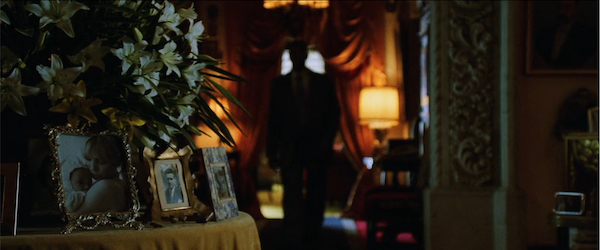
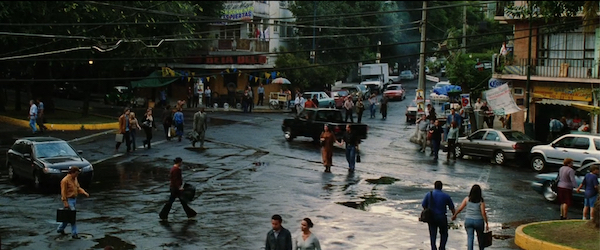
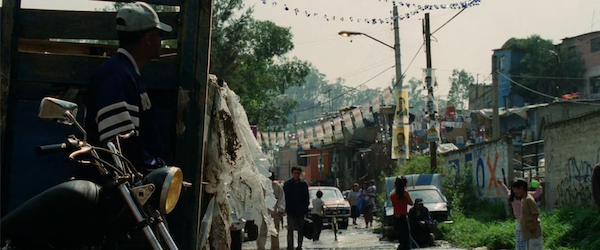
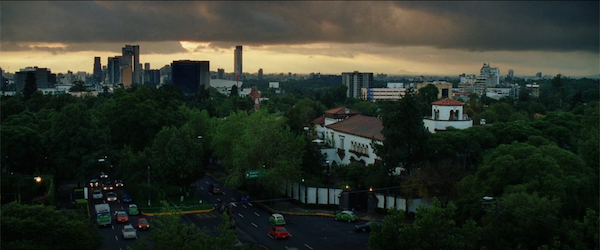
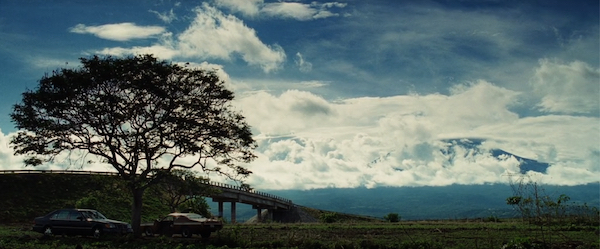


























September 27th, 2023 at 3:28 pm
I love this movie and I think this updated review perfectly captures what made Tony Scott so special in this phase of his career. A lot of directors were into choppy editing, weird closeups, and style over substance. I think, even when I didn’t love his movies, Scott was really intentional and thoughtful about the tools and how he employed them. It didn’t always work, but it didn’t seem like some tacked on stylistic flourish; just a talented guy experimenting with the different tools at his disposal.